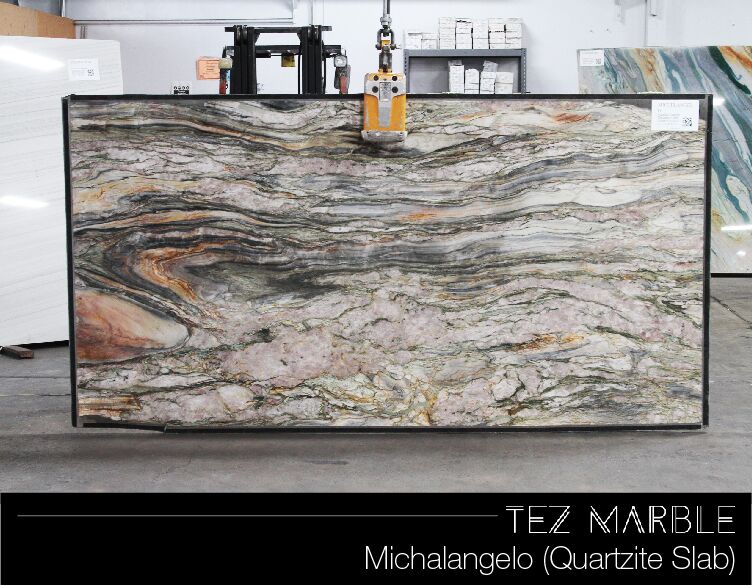Marble has been a trademark of luxury and elegance for centuries. From glorious architecture to beautiful sculptures, marble can be seen everywhere. With its swirly veins and dramatic look, it is best displayed on large areas like countertops. Its beauty and ability to hold immense weight make it ideal for such applications.
Characteristics of Marble
There’s more to marble besides its beauty and strength. While it can hold significant loads, marble is considered a soft stone. Marble has been given a Mohs hardness score of just 3. It is susceptible to stains and scratches if not handled properly. Marble is a high-maintenance stone, which can make homeowners check off marble as a potential material for their kitchen. It also has a porous nature making it easier for moisture to get in and leave a stain. Also, harsh cleaning products should not be kept anywhere near a marble countertop. We’ll get into this in detail later.
As marble is found in enormous deposits that are hundreds of meters thick, it is gathered in huge blocks ready for transport. Due to this, you can have a countertop that was harvested from a single block for a seamless design. Furthermore, marbles come in a variety of colors that are suitable for any aesthetic.
Is Marble Good for Countertops?
There are tons of varieties of marble that come with different prices, designs, patterns, and qualities. The limitless variations of a marble depend on where it was harvested, what impurities it was in contact with, patterns, and veining. So, is marble good for countertops? Let’s weigh the pros and cons:
The Pros of Marble Countertops
- Looks: Be it any other natural stone or manufactured countertops, nothing can beat the sophistication and gracefulness of marble countertops. When designed properly, marble can make the whole room vibrant and make the eyes want more. It is the tender look and stunning swirly veins that bring out people’s sentiments.
- Adds Quality: The elegance that comes with marble does not need to be debated. This elegance adds both tangible and intangible value to the entire house. Walking into the bathroom or kitchen with marble countertops and flooring creates a sense of royalty.
- Durability: If you can keep up with the maintenance and handle it with care, marble will last a lifetime.
The Cons of Marble Countertops
- Porosity: Porosity is the percentage of empty space in a rock. Marble is s porous mineral that, if not handled with care, will leave a permanent stain. You can avoid this can routinely sealing the marble. Sealing at least once annually is highly recommended. If, in the worst-case scenario, you find a stain on your marble countertop, a few drops of ammonia mixed with a solution of hydrogen peroxide and a soft wipe cloth will do the trick.
- Etch: Marble is very prone to scratches if exposed to acidic materials for an extended period, especially where the polish has faded.
- Price: Marble is a costly option when compared to its counterparts. The price starts from around an average of $50 per square foot and goes up to hundreds of dollars depending on the type of marble. This might be outside everyone’s budget.
Tips on Choosing Marble Countertops
Marble is an excellent choice for kitchen and bathroom countertops which comes in great variety, but you need to keep in mind certain things when choosing one. For example, world-famous marbles from Carrara are comparatively nonporous and dense, which makes them both stain-resistant and durable, but they are reactive to acids, so using them in the kitchen is not recommended. It would be best if you were thorough when choosing marble countertops. Here are some tips that could come in handy:
- Examine how different pieces of slabs come together. It would help if you kept a keen eye on where the veins are located and how they will connect with other marble slabs. It needs to look seamless; otherwise, it will ruin the aesthetic instead of enhancing it.
- Consider the different finishes. There are a number of finishes that countertops come in; a certain type of marble might look better in one finish and not so much in another finish. A polished finished marble countertop might turn dull due to etching, while a honed finished marble countertop will not. So, if you’re into cooking, it is recommended you go for a honed finish.
- Keep in mind the edged of the countertop. Marble is easy to work with tools, and hence there are endless edges to choose from. You need to have a vision of how you want the edges to be.
- Look out for cracks when ordering marble countertops. A crack is a sign of marble being dropped from a height. This will compromise its durability. However, a crack is different from a fissure. Fissure is naturally occurring and will not compromise the marble’s strengths. The easiest way to differentiate between crack and fissure is by sliding your fingernail across it. Your nail should slide across the fissure without matching it.
- Seal the marble immediately.

